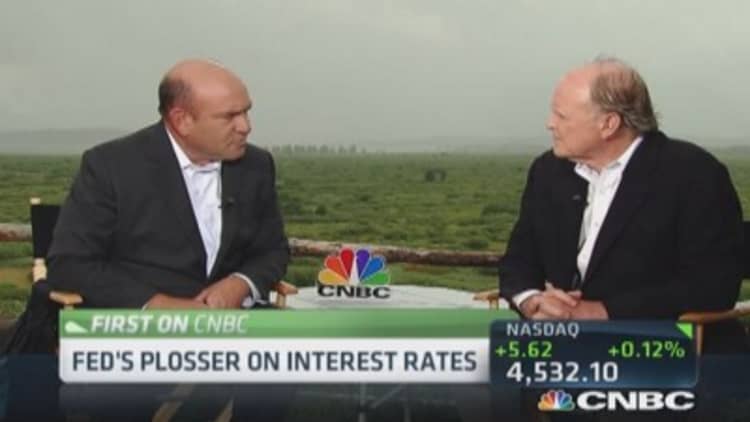Charles Plosser, president of the Philadelphia Federal Reserve Bank and the lone dissenter at the Fed's July policy meeting, on Saturday continued his push for the U.S. central bank to change its language on interest rate policy to reflect an improving economy and pave the way for a faster-than expected-interest rate hike.
Plosser, who is known for his longstanding warnings about potential inflation, said the Fed's steady, accommodative language had fallen out of step with a strengthening economy.
"We must acknowledge and thus prepare the markets for the fact that interest rates may begin to increase sooner than previously anticipated," Plosser said in remarks prepared for delivery to a group of Pennsylvania community bankers gathered for their annual convention at this seaside resort.
"I am not suggesting that rates should necessarily be increased now," said Plosser, who currently is a voter on the Fed's main policy-setting committee. But "our first task is to change the language in a way that allows for liftoff sooner than many now anticipate and sooner than suggested by our current guidance."
Read More Fed's Charles Plosser on 'risky' policy, watching wages

The Fed's policy committee meets later this month in a session that may see Plosser get his wish. In a recent speech at the Fed's annual economic conference in Wyoming, Fed Chair Janet Yellen acknowledged the arguments of those, like Plosser, who feel the economy - and labor markets in particular - may be stronger than they appear by some indicators.
Other Fed officials have also become more vocal about the need for the central bank to begin shifting gears more quickly from policies set to fight the 2007 to 2009 financial crisis and recession.
But the data remains ambiguous: growth has rebounded, for example, but the jobs report for August released on Friday was a disappointment and offered fodder for those on the Fed who feel labor markets are not fully healed.
There were indications, however, that some policymakers were not disturbed by the latest jobs report. Eric Rosengren, president of the Boston Fed, said Friday afternoon that he sees the U.S. economy heading toward full employment, though the path could be faster or slower than currently forecast.
Plosser said that it was difficult for economists to know the true state of the labor market, and dangerous for the Fed to weigh employment issues too heavily in its interest rate decisions.
"Whether you believe that the labor market has fully recovered or not, it is clear that we have made considerable progress toward full employment and price stability," Plosser said. "We are no longer in the depths of a financial crisis nor is the labor market in the same dire straits it was five years ago.
"If monetary policy waits until it is certain that the labor market has fully recovered before beginning to raise rates, policy will be far behind the curve," he said.
--By Reuters

